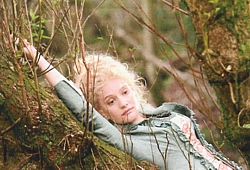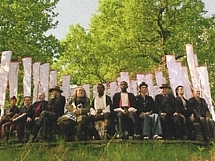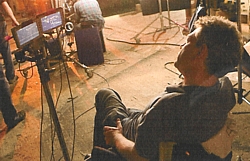|
Shakespeare-san
Saturday Telegraph Magazine, 18 February 2006
Photographs by Laure Sparham
Click photos for larger images
 |
I had wanted to do As You Like It in a Japanese setting since I spent
an afternoon in a garden in Kyoto in 1990, where I had a wonderfully calm
and meditative experience. It seemed to me that the play is, in part, about
the effect that nature can have on us and that this would allow the
audience to experience it in a different way.
The film opens with a Kabuki piece. During my research in Japan I
went to see everything pertinent, from calligraphers to bonsai gardeners,
and the film attempts to evoke some of these cultural elements of Japan and
to celebrate them. This [the photo] is my attempt to convey to Stuart
Hopps, our choreographer, and the young lad Takuya Shimada, who is playing
the geisha, how he should dance - which seems to suggest a level of
confidence in my Kabuki work that isn't entirely justified. |
|
Stuart has worked for me for 10 to 12 years. One of his great gifts
as a choreographer is to be adaptable, because when you are putting dance
on to film, last-minute changes are inevitable. I think the expressions
here are to do with having been asked for the 15th time to do something
different from what we have already agreed, and which I'd OK'd three weeks
previously. This is one of those occasions where we are in the world of the
DFI, which you might translate as 'Different Flipping Idea'. So, this is
the pained look of the geisha who is on the receiving end of a DFI. A DFI
ill-executed by the so-called director. |
|
One of the things I like about this shot is the attitude in it. This
is the very beautiful Romola Garai as Celia, who first suggests the flight
into the forest to her friend Rosalind but then finds the change from the
life of a pampered princess much harder than she imagined. Here she is
having to do manual work for the first time - raking the stones on the bed
of a formal Japanese garden. I love the incongruity of the young
19th-century aristocrat on a rock in a gravel garden.
We shot all our exteriors at Wakehurst Place (Kew's sister garden) in
Sussex where they have an extraordinary variety of gardens, including a
Japanese one, and some wonderful rare woodland. One of my favourite films
is Powell and Pressburger's Black Narcissus where they created the
Himalayas at Denham Studios and at a location in Sussex not far from here,
which gave me the idea of creating Japan in England. It was a highly
unusual setting, unfilmed-in, away from air traffic. If we had gone to
Kyoto it would have been hard to find a location with the variety that we
found here and the peace and quiet that we needed for such a dialogue-heavy
film. |
 |
 |
We were of course trying to have fun with the comedy. Alfred Molina
and Kevin Kline are two extraordinarily gifted comic actors so it was a
treat to see them working together for the first time. This is Touchstone,
the professional fool, trying to impress Jacques, the dry philosopher, by
producing his version of t'ai chi which has clearly not been handed down to
him by the masters. The town/country clash that is at the heart of the play
is very much alive in Touchstone, an urban guy in a country environment. To
emphasise this we kept his clothes ludicrous, and Fred suggested the
enormous silly blow-dried quiff which makes him look like a grotesque
period Elvis, completely contemptuous of the beautiful landscape around
him. And this makes for an unlikely alliance with Jacques who admires the
selfishness, the complete disdain for others and Touchstone's absolute
certainty about himself, whereas Jacques is constantly dissatisfied and
questioning who he is and what things mean and why we are here. |
|
This is Celia trying to use her feminine wiles to convince an
indifferent shepherd that, merely as a result of her beauty and her ability
to loll sensually against a tree, he should give them food and lodgings.
But it is also a prelude to something that Romola and Bryce Dallas Howard
(Rosalind) were very good at, which is physical comedy. The hardships of
the forest produce a lot of physical comedy and the two girls and David
Oyelowo (Orlando) were always keen to undercut any moments where the
romance seemed too precious or the characters take themselves too
seriously. There is a lot of slapstick in the film, so this is a ravishing
picture of Celia just before what you might call a 'custard pie' moment. |
 |
 |
At the end of every Shakespeare comedy, in a way that depresses some
people, there is a wedding, with dancing and singing, so one of the
challenges was to do this in a Japanese setting. I have always found prayer
flags very attractive and was struck by the way the Japanese use paper
throughout their culture. I though it would look wonderful against the
green of the English spring - it would also make our point about how Japan
meets the play. So we put all our men against the flags at the top of the
hill, waiting for their brides. |
|
Many thinl that As You Like It is a bucolic, lyrical comedy and yet
the very first couple of scenes are about the racorous dispute between
Orlando, our hero, and Oliver, his brother, and I wanted to keep the play
away from being too soft and lyrical and easy. So it was wonderful to get
David Oyelowo as Orlando and Adrian Lester as Oliver. They are
fantastically adroit with Shakespearean language but also vigorous and
masculine - they do all their own stunts. David was scarily smart with his
sword and dagger and it's a very positive force in the film that sets a lot
of the lighter romantic comedy stuff in sharp relief. This is him at his
most aggressive in the scene where Orlando attacks the camp fo Duke Senior
(Brian Blessed) looking for food for Adam, his old servant. This discord
runs through the play, keeping a disturbing energy beneath it which means
that all the romances and good deeds are set against the possibility of
real danger. |
 |
 |
This is the very first shot of the movie. Alex Wyndham, just out of
RADA, was playing the lovelorn Sylvius and this was his first day as a
professional actor. The first thing he had to do was lie on a boat and yell
- and we gave him a round of applause. I found something very touching in
it, it really took me back. Not that Alex specifically reminds me of me at
that age - he's about five million times more handsome and hunky - but
here's a guy at the start of his career, super-enthusiastic and getting an
instant education in filmmaking. That's a mark, you must hit it; that man
will be running a tape up to your eye [the focus puller] - you could see
his mind whirring. And then at lunchtime looking like a man of 65 because
he was so burned up. It was a lovely mood to have on the first day and very
much in the spirit of the film itself, which has the follies,
vulnerabilities and frailties of youth at its centre. His enthusiasm and
optimism were a breath of fresh air. |
|
When I started making films, with Henry V, we didn't have a video
village full of monitors where the director sat away from the action - and
over the years I haven't got much more used to it so I still try to watch
things live. But this was a special-effects shot where we were burning a
stable. In my body language you can see the 'Did we really do all that?'
feeling I always get at the end of a movie. The process is still miraculous
to me. To get from idea to shooting is, in itself, a five-act drama of
meetings, travellings, hopings, wishings, disappointments and humiliations
that might take anything from six months to six years. Here I am on the
last day or two of filming thinking, 'I sat in a stone garden in Japan 15
years ago, another five years to get to the stage where HBO wanted it.
Could we find a location, could we get the cast, how do we make Japan work
in England?' So I'm amused, bemused, thrilled, excited, exhausted and very
glad to be sitting down. |
 |
Back to the As You Like It page | Back to Articles Listing | Back to the Compendium |